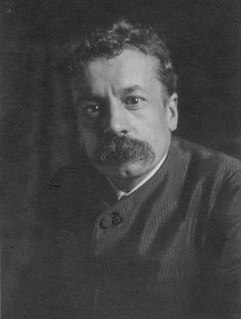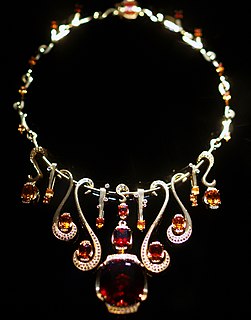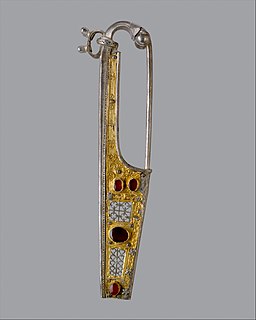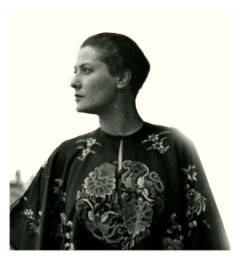Related Research Articles

Jewellery (UK) or jewelry (U.S.) consists of decorative items worn for personal adornment, such as brooches, rings, necklaces, earrings, pendants, bracelets, and cufflinks. Jewellery may be attached to the body or the clothes. From a western perspective, the term is restricted to durable ornaments, excluding flowers for example. For many centuries metal such as gold often combined with gemstones, has been the normal material for jewellery, but other materials such as glass, shells and other plant materials may be used.

René Jules Lalique was a French jeweller, medallist,and glass designer known for his creations of glass art, perfume bottles, vases, jewellery, chandeliers, clocks, and automobile hood ornaments.

A necklace is an article of jewellery that is worn around the neck. Necklaces may have been one of the earliest types of adornment worn by humans. They often serve ceremonial, religious, magical, or funerary purposes and are also used as symbols of wealth and status, given that they are commonly made of precious metals and stones.

The Cullinan Diamond is the largest gem-quality rough diamond ever found, weighing 3,106.75 carats (621.35 g), discovered at the Premier No.2 mine in Cullinan, South Africa, on 26 January 1905. It was named after Thomas Cullinan, the owner of the mine. In April 1905, it was put on sale in London, but despite considerable interest, it was still unsold after two years. In 1907, the Transvaal Colony government bought the Cullinan and Prime Minister Louis Botha presented it to Edward VII, King of the United Kingdom, who had it cut by Joseph Asscher & Co. in Amsterdam.

A brooch is a decorative jewelry item designed to be attached to garments, often to fasten them together. It is usually made of metal, often silver or gold or some other material. Brooches are frequently decorated with enamel or with gemstones and may be solely for ornament or serve a practical function as a clothes fastener. The earliest known brooches are from the Bronze Age. As fashions in brooches changed rather quickly, they are important chronological indicators. In archaeology, ancient European brooches are usually referred to by the Latin term fibula.

The French Crown Jewels comprise the crowns, orb, sceptres, diadems and jewels that were symbols of Royal power between 752 and 1825. These were worn by many Kings and Queens of France as well as Emperor Napoleon. The set was finally broken up, with most of it sold off in 1885 by the Third Republic. The surviving French Crown Jewels, principally a set of historic crowns, diadems and parures, are mainly on display in the Galerie d'Apollon of the Louvre, France's premier museum and former royal palace, together with the Regent Diamond, the Sancy Diamond and the 105-carat (21.0 g) Côte-de-Bretagne red spinel, carved into the form of a dragon. In addition, some gemstones and jewels are on display in the Treasury vault of the Mineralogy gallery in the National Museum of Natural History.

Cartier International SNC, or simply Cartier, is a French luxury goods conglomerate that designs, manufactures, distributes, and sells jewellery, leather goods, and watches. Founded by Louis-François Cartier (1819–1904) in Paris in 1847, the company remained under family control until 1964. The company is headquartered in Paris and is a wholly owned subsidiary of the Swiss Richemont Group. Cartier operates more than 200 stores in 125 countries, with three Temples in London, New York, and Paris.

Princess Zinaida Nikolayevna Yusupova was an Imperial Russian noblewoman, the only heiress of Russia's largest private fortune of her time. Famed for her beauty and the lavishness of her hospitality, she was a leading figure in pre-Revolutionary Russian society. In 1882, she married Count Felix Felixovich Sumarokov-Elston, who served briefly as General Governor of Moscow Military District (1914–1915). Zinaida is best known as the mother of Prince Felix Yusupov, the murderer of Rasputin. She escaped revolutionary Russia and spent her remaining years living in exile.

Queen Elizabeth II owned a historic collection of jewels – some as monarch and others as a private individual. They are separate from the gems and jewels of the Royal Collection, and from the coronation and state regalia that make up the Crown Jewels.

Elizabeth Gage MBE is a British jewellery designer and trained master goldsmith who has been creating collectable jewellery for over 50 years. She has been described by the trade as someone "whose large rings, historical references, gorgeous stones and elaborate craftsmanship set the tone for a whole generation".
Graff is a British multinational jeweller based in London. It was founded by British jeweller Laurence Graff in 1960. A vertically integrated company, Graff operations comprise the design, manufacture and retail distribution of jewellery and watches.

The Hooker Emerald Brooch is an emerald brooch designed by Tiffany & Co. The brooch is on display in the Janet Annenberg Hooker Hall of Geology, Gems, and Minerals at the Smithsonian Institution's National Museum of Natural History in Washington D.C., United States.

Suzanne Belperron (1900–1983), born in Saint-Claude, France, was an influential 20th-century jewellery designer based in Paris. She worked for the Boivin and Herz jewellery houses before the outbreak of World War II. Subsequently, she took over the Herz company, renaming it Herz-Belperron. Belperron had many important client, from royalty, arts and show business on both sides of the Atlantic.
Hemmerle is a Munich-based jeweller founded in 1893 by brothers Joseph and Anton Hemmerle.
Giovanni Corvaja is an Italian jewellery artist known for fine wire work.

Crown Jewels of the Netherlands is the jewellery used by the Dutch royal family, which is sometimes dubbed "crown jewels". In the past, the terms "House-diamonds", "House-jewels" and "family jewels" have been used. In 1790 the term "Bijoux de la Couronne" was used by Luise of Brunswick -Wolfenbüttel to refer to a large diamond from Borneo. In 1896 the Firm of van Kempen & Begeer wrote about resetting the jewels of the Crown. Queen Juliana gave a selection of her formal jewelry to the new Foundation Regalia of the House of Orange-Nassau, instituted on 27 July 1963. In 1968 a Foundation "Kroongoederen van het Huis van Oranje-Nassau" was instituted. It owns the regalia and the House-jewels.
Ana Khouri is a New York-based jewellery designer known for her styled ear cuffs and jewellery created with ethically-sourced gemstones.

On 25 November 2019, royal jewellery was stolen from the Green Vault museum within Dresden Castle in Dresden, Saxony, Germany. The stolen items include the 49-carat Dresden White Diamond, the diamond-laden breast star of the Polish Order of the White Eagle which belonged to the King of Poland, a hat clasp with a 16-carat diamond, a diamond epaulette, and a diamond-studded hilt containing nine large and 770 smaller diamonds, along with a matching scabbard. The missing items were of great cultural value to the State of Saxony and were described as priceless; other sources estimate the total value at about €1 billion.

Hermann Ruissel or Herman Ruissel was a medieval Parisian goldsmith who crafted jewelry for the King of France and other persons of high rank.
Anna Hu is a Taiwanese-American jewelry designer.
References
- ↑ Chen, Jian-Hou (9 November 2010). 〈國際時尚圈炙手可熱的設計師 趙心綺:她的珠寶藝術,啟蒙自台灣廟宇建築師〉. Global Views Monthly (in Chinese (Taiwan)).
- 1 2 Stefanie Waldek. "How Architecture Inspires Renowned Couture Jeweler Cindy Chao". ARCHITECTURE + DESIGN, 15 July 2019.
- 1 2 Anthony DeMarco. "Cindy Chao And The Business Of High Jewelry". Forbes, 6 November 2016.
- ↑ "A Rare and Impressive Fancy Coloured Diamond and Diamond Dress Ring, by Cindy Chao". Bonhams, 26 Nov 2017.
- 1 2 Emilie Yabut-Razon."Jewellery Designer Cindy Chao Makes Her Masterpiece London Debut". HK TATLER, 21 June 2018.
- ↑ MARIA DOULTON."Cindy Chao's Outstanding Object Award Masterpiece London". The Jewellery Editor, 11 Jul 2018.
- ↑ "STYLE Edit: Jeweller Cindy Chao brings her Black Label Masterpieces to Asia". SCMP STYLE, 8 Oct 2018.
- ↑ Anthony DeMarco. "Getting Personal With A Cindy Chao High Jewelry Masterpiece". Forbes, 19 Jul 2019.
- ↑ Annabel Davidson."How Taiwanese jeweller Cindy Chao's unrivalled artistry earned her the top award at Masterpiece 2019". The Telegraph, 27 Jun 2019.
- ↑ Jakki Phillips."Jeweller Cindy Chao Discusses Legacy, Celebrities And Her Debut At TEFAF". HK TATLER, 17 Jun 2019.
- ↑ . Smithsonian National Museum of Natural History
- ↑ . Smithsonian National Museum of Natural History
- ↑ . Smithsonian National Museum of Natural History
- ↑ Cindy Chao: jewels as art | The Jewellery Editor
- ↑ Cindy Chao's Butterfly Brooch Added to Smithsonian Gem Hall – Forbes
- 1 2 "Cindy Chao's First Butterfly Brooch Enters Prestigious Paris Museum of Decorative Arts". Forbes .
- 1 2 3 Beckett, Kathleen (23 January 2020). "In Paris, Champagne and a Butterfly". The New York Times.
- 1 2 "A Jewel by Cindy Chao Makes Couture Week History in Paris". 20 January 2020.
- 1 2 "Cindy Chao's First Annual Butterfly Joins the Musée des Arts Décoratifs". 12 February 2020.
- 1 2 3 4 "Brooch | Chao, Cindy | V&A Explore the Collections".
- 1 2 "The Cindy Chao 'Peony Brooch' Inducted into the V&A Museum". Forbes .
- 1 2 3 "On display: Cindy Chao at the V&A".
- 1 2 "CINDY CHAO the Art Jewel Announces Induction into London's Museum". 2 June 2021.
- ↑ "Cindy Chao Receives One of France's Highest Artistic Honors". Forbes .
- ↑ "Cindy Chao Inducted into France's Order of Arts and Letters". 18 November 2021.
- ↑ "Cindy Chao is Appointed Chevalier dans l'Ordre des Arts et Lettres by the French Ministry of Culture". 14 December 2021.
- ↑ "Taking Flight: Cindy Chao's Bejewelled Butterflies". HK TATLER, 28 Feb 2019.
- ↑ Cindy Chao: jewels as art | The Jewellery Editor
- ↑ Cindy Chao's Butterfly Brooch Added to Smithsonian Gem Hall – Forbes
- ↑ Cindy Chao Butterfly Brooch at Smithsonian Museum of Natural History – Taiwanese Jewelry Designer Cindy Chao – Town & Country Magazine
- ↑ Sarah Jessica Parker Spreads her Wings with Cindy Chao Archived 2014-07-11 at the Wayback Machine . Glam.